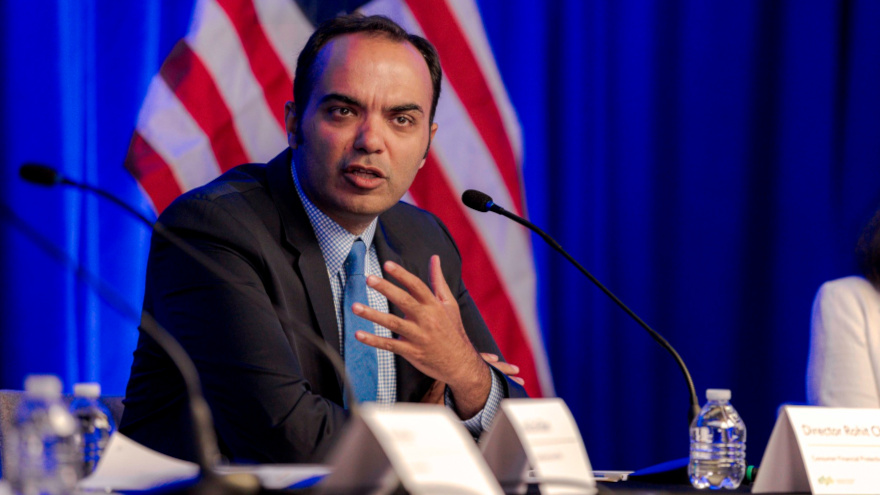UPDATED: Chopra out at CFPB & acting director revealed; bureau examines auto financing & servicemembers

Former Consumer Financial Protection Bureau director Rohit Chopra. Photo by Ledon Carroll / CFPB.
By subscribing, you agree to receive communications from Auto Remarketing and our partners in accordance with our Privacy Policy. We may share your information with select partners and sponsors who may contact you about their products and services. You may unsubscribe at any time.
Rohit Chopra no longer is the director of the Consumer Financial Protection Bureau, confirming the matter in a letter addressed to President Trump and posted via social media on Saturday.
But before Chopra concluded his time in bureau leadership, the CFPB highlighted eight findings in a 46-page report focused on auto financing and servicemembers.
How the bureau now proceeds will be up to a new director, and an acting one has been designated, according to a statement issued by the CFPB on Monday afternoon.
“It has been an extraordinary privilege to serve as director of the Consumer Financial Protection Bureau (CFPB) and as a member of the board of directors of the Federal Deposit Insurance Corporation since 2021, as well as to serve as a commissioner of on the Federal Trade Commission from 2018 to 2021,” Chopra wrote to begin his letter to Trump. “I am grateful to both President Biden and you for nominating me and to the United States Senate for confirming me to these positions.
“I am proud that the CFPB has done so much to restore the rule of law,” Chopra continued in the letter. “This letter confirms my term as CFPB director has concluded. I know the CFPB is ready to work with you and the next confirmed director, and we have devoted a great deal of energy to ensure continued success.”
The CFPB said Trump designated Secretary of the Treasury Scott Bessent as acting director.
Subscribe to Auto Remarketing to stay informed and stay ahead.
By subscribing, you agree to receive communications from Auto Remarketing and our partners in accordance with our Privacy Policy. We may share your information with select partners and sponsors who may contact you about their products and services. You may unsubscribe at any time.
“I look forward to working with the CFPB to advance President Trump’s agenda to lower costs for the American people and accelerate economic growth,” Bessent said in the statement that indicated Trump made the move on Friday.
Bessent officially became Secretary of the Treasury last Tuesday.
According to his biography on the Treasury website, Bessent served as chief executive officer and chief investment officer of Key Square Capital Management, a global hedge fund focused on macro investing that he founded in 2015.
Prior to that time, Bessent was the chief investment officer of Soros Fund Management.
Who becomes the next permanent CFPB director isn’t known at this juncture. But Sen. Elizabeth Warren, the Massachusetts Democrat and ranking member of the Senate Banking Committee, made this pledge on Saturday.
“President Trump campaigned on capping credit card interest rates at 10% and lowering costs for Americans,” Warren said. “He needs a strong CFPB and a strong CFPB director to do that. But if President Trump and Republicans decide to cower to Wall Street billionaires and destroy the agency, they will have a fight on their hands.”
Latest bureau report on auto financing
Meanwhile, before the CFPB leadership went into a state of change, the bureau shared a new report about auto financing and servicemembers.
The bureau said it analyzed contract-level information from six finance companies and found that servicemembers experience increased financial risks at many points in auto financing compared to non-servicemembers.
According to the report, the eight top findings included:
—Servicemembers borrowed more than non-servicemembers
—Servicemembers and non-servicemembers purchased similarly priced vehicles.
—Servicemembers are less likely to make a cash down payment and make smaller down payments when they do
—Servicemembers were more likely to trade in vehicles with negative equity
—Servicemembers spent more on add-on products than non-servicemembers, although both groups paid for similar add-on products
—Servicemembers had higher interest rates and longer contract terms than those of non-servicemembers.
—Higher amounts financed and higher APRs translated into higher monthly payments for servicemembers than non-servicemembers, even accounting for servicemembers’ longer contract terms
—In contrast with the above findings, servicemembers were less likely to have their vehicle repossessed or voluntarily surrendered compared with non-servicemembers.
“There is little literature regarding the challenges servicemembers face in the auto lending market and these experiences can have implications for servicemembers economic well-being and financial stability,” the CFPB said.
“In particular, debt may affect whether servicemembers receive and maintain a national security clearance. In addition to possible loss of their security clearance, servicemembers who fail to pay their debts also face other unique consequences such as military disciplinary action, delayed career progression, and termination from employment,” the bureau continued.
“These data and analyses provide a first look into how servicemembers fare in navigating the auto lending market as compared to non-servicemembers. The CFPB will continue to monitor this market and update these findings with additional analyses when appropriate,” the bureau went on to say.


